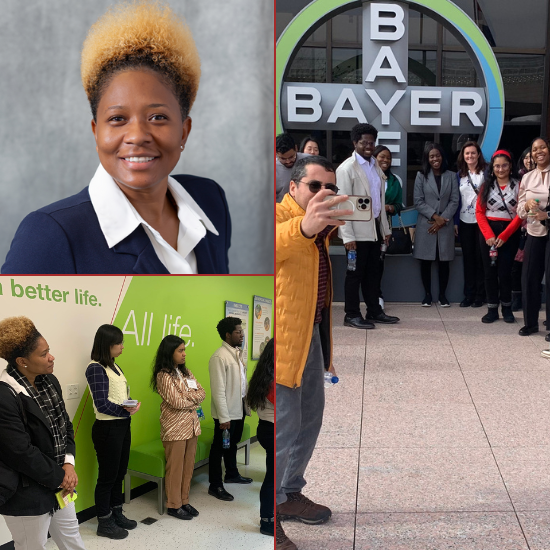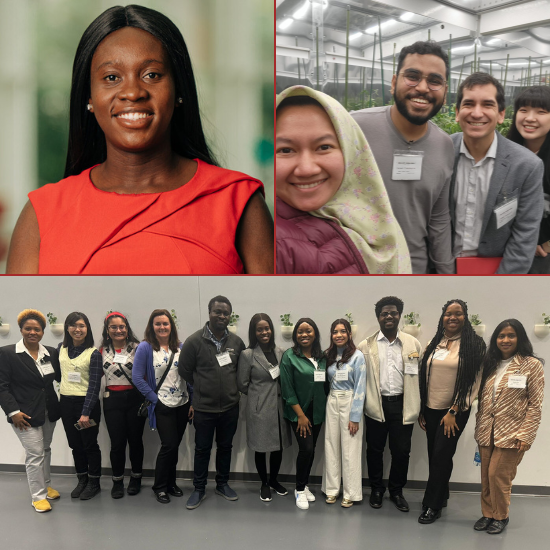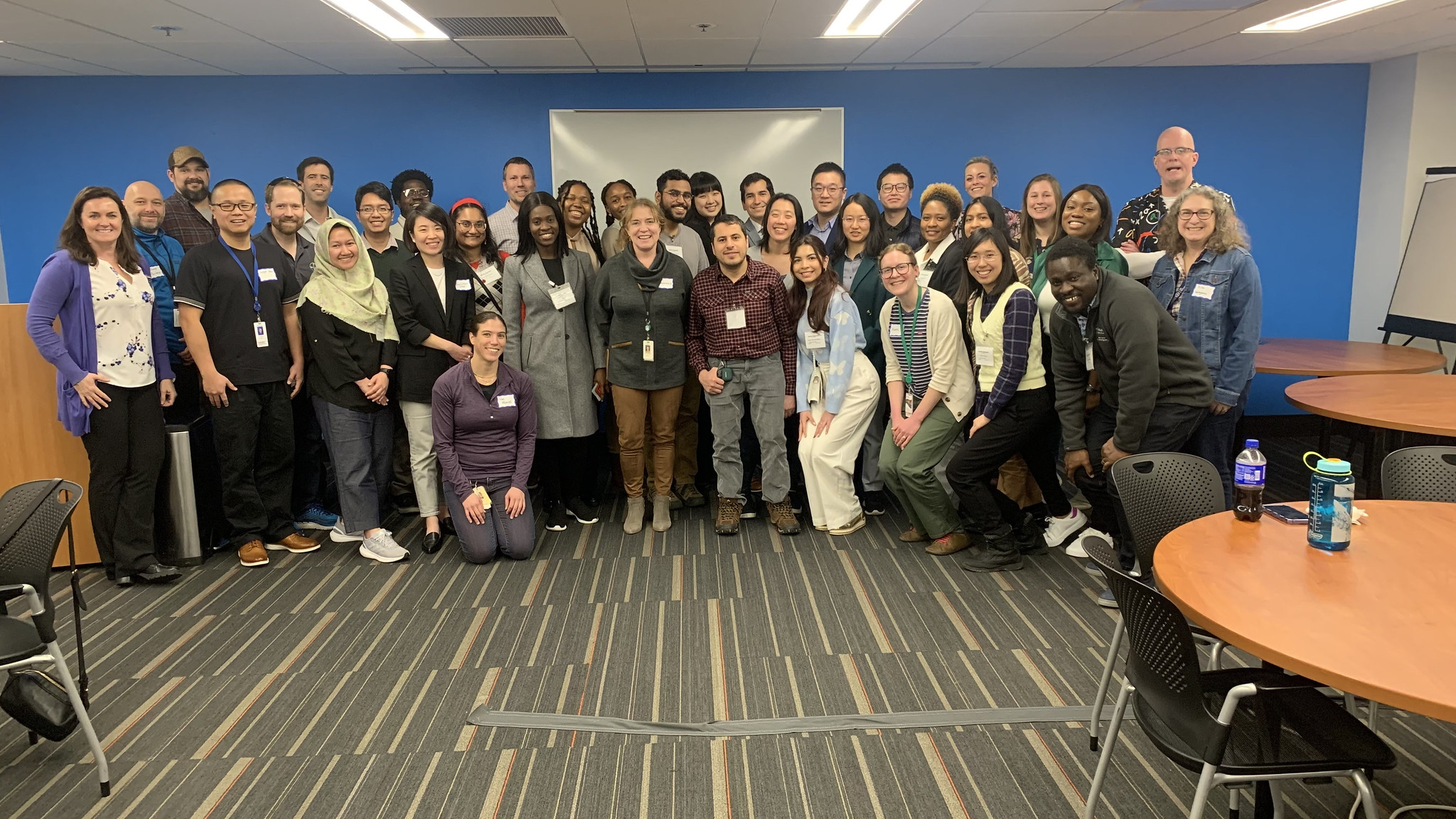Through engaging discussions, a guided tour, and a networking lunch, Scholars deepened their understanding of the intersection between academia and industry.
Stepping into the world of Bayer with our exclusive corporate showcase, McDonnell Scholars experienced firsthand the embodiment of the McDonnell Academy’s three pillars: engaged in discussions on leadership development while exploring Bayer’s diverse sectors, from crop science to pharmaceuticals, and consumer health; established connections within a strong scientific community; and fostered international collaboration with a global mindset while navigating the intersection of academia and industry together.
Read personal accounts from Scholars who were part of this engaging experience.
McDonnell Scholar Vanette Clark
Bayer Crop Science: An Empirical Experience in Global Leadership, Social Innovation, and Greater Possibility

Recently, students from the McDonnell International Scholars Academy received a distinct opportunity to tour the Bayer Crop Science’s Chesterfield Campus, as an enriching experience designed to foster a global leadership mindset and innovation, while stimulating an interdisciplinary approach to solving societal complexities, such as access to nutrition.
During the tour, several sites would enhance the agricultural understanding and business development of participating McDonnell Scholars through an informed experience. For instance, plant chambers are essential to Bayer researchers, which allows them to cultivate high-grain products, maximizing land use with high-yield results, while remaining committed to their vision of alleviating food scarcity. Its Business-to-Business-to-Consumer Model (B2B2C) affords farmers an opportunity to choose from an array of seeds tailored to their specific soil, climate, and production requirements, thus making production available for purchase. Furthermore, Bayer’s tailored approach to seed treatment through advancements in crop protection (fungicides, herbicides, and insecticides) offers farmers a viable option for minimizing crop damage. In my opinion, these examples express a fundamental understanding of business evolution and a company’s approach to staying relevant, innovative, and competitive.
As an emerging researcher, similarities in my research interests (i.e. the influence of improper nutrition on the brain development of high school aged youth) to Bayer’s mission, “Health for all, Hunger for none” were noted. While my research inquiry originates from a thought – a phenomenon I wish to explore, Bayer’s agricultural and business processes begins with a seed.
Bayer’s technological advancements, such as its digital agriculture tools (i.e. Climate Fieldview) allow farmers to analyze collected data from their own farm equipment, and receive prescribed information to maximize yields. Within the implementation of technological advancements are innovative ideas of regenerative farming, which focus on improving soil health and building its resiliency, as well as increasing carbon removals, and maintaining or restoring soil biodiversity. Through regenerative farming, each farm would act as its own ecosystem, which would provide robust agriculture data for a tailored solution to its unique set of challenges. With the expected growth of the world population, in addition to our diminishing water supply, advancements such as these could prove highly beneficial for humanity’s sustainability.
Just before boarding the bus to return to our WashU campus, I recall being filled with a sense of greater possibility through purpose, leadership, and social innovation.
Luther Burbank, an American botanist, horticulturist and pioneer in agricultural science was quoted in the Autobiography of a Yogi, saying, “I see humanity now as one vast plant, needing for its highest fulfillments only love…” Humanity has arrived at a new frontier, and is demanding us to contemplate and implement strategies, specifically interdisciplinary, which may contribute to its well-being and – restoration.
Touring the Bayer Crop Science campus was an exceptional experience, and yields to us an enriching multidimensional model for global leadership and innovation in this new frontier.
VaNetta Clark joined the McDonnell International Scholars Academy in 2023. She is a pursuing a PhD in Education at the School of Arts & Sciences at WashU.
McDonnell Scholar Gloria Wiredu
Interdisciplinary Innovation: Bridging Academia and Industry at Bayer Crop Science Research Center

At the heart of the Bayer Crop Science Research Center, a panel discussion vividly showcased the dynamic interplay between academia and industry, highlighting the transformative power of interdisciplinary collaboration. This gathering, part of the innovative partnership between McDonnell Academy and Bayer, brought to light the diverse journeys of individuals from varied academic backgrounds who have found a unified purpose in Bayer’s mission to address some of the most pressing global challenges.
The stories shared by the panelists, ranging from animal sciences to molecular biology, and even a transition from theater arts to medical affairs in Bayer, illustrated a compelling truth: innovation thrives at the crossroads of diverse fields. This diversity not only enriches the research and development process but also fosters a culture of adaptability and lifelong learning, crucial for advancing agricultural and biotechnological solutions.
A lot of people asked, “Why is an emergency doctor going into agriculture? And so that seemed like it’s completely different but it is actually a natural change. The door was opened, and I realized that from my previous experiences, agriculture is the foundation of civilization…And having seen the levels of malnutrition that we don’t see here in the West and the impact of that, I realized that I was going to have a much bigger global impact than I would have had teaching in medical school.”Sarah Eliza Lockwood; Medical Affairs Lead, Bayer
One of the key reflections from the discussion was the importance of being open to new experiences and the value of continuous growth, highlighting that curiosity and adaptability are the driving forces behind meaningful innovation.
Moreover, the collaboration between McDonnell Academy and Bayer exemplifies how bridging academia and industry can lead to groundbreaking advancements and prepare scholars for a multitude of career paths.
The panel highlighted the indispensable role of interdisciplinary skills in solving complex problems and driving forward innovation. Reflecting on the insights shared, it’s clear that the journey to making a significant impact is filled with opportunities for making a difference. Through embracing diversity, fostering collaboration, and pursuing relentless curiosity, we can unlock the doors to innovation and contribute to a sustainable and prosperous future.
Gloria Wiredu joined the McDonnell International Scholars Academy in 2023. She is a pursuing a MBA in Olin Business School at WashU.

